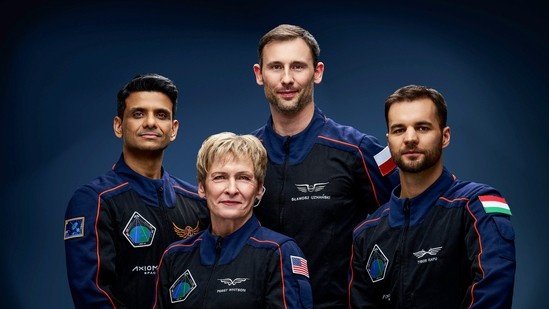
Historic Milestone for India
On May 29, 2025, Group Captain Shubhanshu Shukla of the Indian Air Force (IAF) is set to become the first Indian astronaut to embark on a private mission to the International Space Station (ISS). As the pilot for Axiom Mission 4 (Ax-4), Shukla will join a diverse crew aboard a SpaceX Dragon spacecraft launched from NASA’s Kennedy Space Centre in Florida. This mission marks a significant collaboration between India’s space agency, ISRO, and Axiom Space, a private American company specializing in human spaceflight.
A Diverse and Experienced Crew
The Ax-4 crew comprises four members from various international space agencies. Commanding the mission is former NASA astronaut Peggy Whitson, who now serves as Axiom Space’s Director of Human Spaceflight. Alongside her are mission specialists Sławosz Uznański-Wiśniewski from the European Space Agency (ESA) and Tibor Kapu from the Hungarian Space Office. Shukla, as the pilot, will be responsible for navigating the spacecraft and assisting in the execution of scientific experiments during the mission.
Training Across Continents
Preparation for this mission has been rigorous and international in scope. Shukla and his backup, Group Captain Prashanth Nair, have undergone extensive training with various space agencies, including NASA, ESA, and the Japan Aerospace Exploration Agency (JAXA). Their training included sessions at ESA’s European Astronaut Centre in Cologne, Germany, where they learned about communication systems and emergency response procedures within the ISS’s multinational environment. Additionally, they visited JAXA’s Tsukuba Space Centre in Japan to familiarize themselves with the Japanese Experiment Module (Kibo), ensuring they are well-prepared to operate within the diverse and complex systems of the ISS.
Scientific Endeavors in Microgravity
During their approximately two-week stay aboard the ISS, Shukla and his fellow crew members will conduct a series of scientific experiments in microgravity. These experiments are designed to advance understanding in various fields, including human health, materials science, and space technology. Shukla is expected to perform five experiments developed by ISRO and Indian institutions, focusing on areas such as the cognitive effects of screen use, microbial adaptation, muscle atrophy, and crop resilience in microgravity. The data gathered from these experiments will contribute valuable insights for future space missions, including India’s Gaganyaan program.
A Symbol of International Collaboration
The Ax-4 mission symbolizes a significant step in international collaboration in space exploration. It underscores the growing role of private companies in facilitating human spaceflight and highlights the importance of partnerships between governmental and private entities in advancing space research. For India, this mission not only represents a milestone in its space exploration efforts but also strengthens its ties with international space agencies and private spaceflight companies.
Looking Ahead
As the launch date approaches, anticipation is building for what will undoubtedly be a historic moment in India’s space exploration journey. Shukla’s participation in the Ax-4 mission exemplifies the nation’s growing capabilities in space science and technology. It also serves as an inspiration for future generations of scientists and engineers, demonstrating the possibilities that lie ahead in the realm of space exploration. The success of this mission could pave the way for more Indian astronauts to participate in international and private space missions, further solidifying India’s position in the global space community.








































Leave a Reply